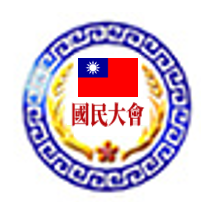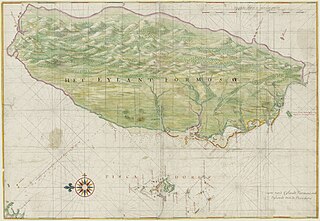
The Democratic Progressive Party (DPP) is a Taiwanese nationalist and centre-left political party in Taiwan. Controlling both the Taiwan Presidency and the unicameral Legislative Yuan, it is the majority ruling party and the dominant party in the Pan-Green Coalition.

The politics of the Republic of China take place in a framework of a representative democratic republic, whereby the President is head of state and the Premier is head of government, and of a multi-party system. Executive power is exercised by the government. Legislative power is vested in primarily with the parliament and limited by government. The Judiciary is independent of the executive and the legislature. The party system is dominated by the Kuomintang, which favors closer links to mainland China, and the Democratic Progressive Party, which favors Taiwanese independence.

The President of the Republic of China is the head of state of the Republic of China. Since 1996, the President is directly elected by plurality voting to a four-year term, with at most one re-election. The incumbent, Tsai Ing-wen, succeeded Ma Ying-jeou on 20 May 2016 as the first female president in the state's history. Originally established in Nanking in 1912, the government and its president relocated to Taipei in 1949 after losing the Chinese Civil War.

The Legislative Yuan is the unicameral legislature of the Republic of China now based in Taiwan. It is one of the five branches of government stipulated by the Constitution of the Republic of China, which follows Sun Yat-sen's Three Principles of the People.

The National Assembly were several national parliamentary government organizations of the Republic of China, now commonly known as Taiwan.

During the National Constituent Assembly session on December 25, 1946 in Nanjing, the fifth and current Chinese constitution, known as the Constitution of the Republic of China, was ratified by the Kuomintang and adopted on December 25, 1947. Since 1949, the constitution, along with its Additional Articles, remains effective in ROC-controlled territories.

The Tangwai movement, simply Tangwai, was a political movement in the Republic of China (Taiwan) in the mid-1970s and early 1980s. Although the Kuomintang (KMT) had allowed contested elections for a small number of seats in Legislative Yuan, opposition parties were still forbidden. As a result, many opponents of the KMT, officially classified as independents, ran and were elected as members "outside the party."

As a result of the surrender of Japan at the end of World War II, the island of Taiwan was placed under the governance of the Republic of China (ROC), ruled by the Kuomintang (KMT), on 25 October 1945. Following the February 28 massacre in 1947, martial law was declared in 1949 by the Governor of Taiwan Province, Chen Cheng, and the ROC Ministry of National Defense. Following the Chinese Civil War in 1949, the ROC government retreated from the mainland as the Communists proclaimed the establishment of the People's Republic of China. The KMT retreated to Taiwan and declared Taipei the temporary capital of the ROC. For many years, the ROC and PRC each continued to claim in the diplomatic arena to be the sole legitimate government of "China". In 1971, the United Nations expelled the ROC and replaced it with the PRC.

The Election for the 6th Legislative Yuan (第六屆立法委員選舉) of Taiwan was held on December 11, 2004. All 225 seats of the Legislative Yuan were up for election: 168 elected by popular vote, 41 elected on the basis of the proportion of nationwide votes received by participating political parties, eight elected from overseas Chinese constituencies on the basis of the proportion of nationwide votes received by participating political parties, eight elected by popular vote among the aboriginal populations. Members served three-year terms beginning on February 1, 2005, and ending January 31, 2008. The next term served four years.

Elections in Taiwan are held on national and local level. On the national level, the head of state, the President, and members of the national legislature, the Legislative Yuan, are elected directly by citizens of Taiwan. National elections are held every four years.

This is a timeline of the Republic of China.

The People's Republic of China (PRC) claims the island of Taiwan to be part its territory under its Constitution as the Taiwan Province. In combination with the Republic of China-controlled Fujian islands, it is usually referred to by mainland media as the Taiwan Region or Taiwan Area.

The Government of the Republic of China, commonly known as the Government of Taiwan, is the democratic, constitutional government that exercises control over Taiwan and other islands in the free area. The president is the head of state. The government consists of Presidency and five branches (Yuan), the Executive Yuan, Legislative Yuan, Judicial Yuan, Examination Yuan, and Control Yuan.
The first supplementary elections took place for the National Assembly and the Legislative Yuan in the Republic of China on 20 December 1969. Voter turnout was 54.7% and 55.0% respectively.
The second supplementary elections took place for the National Assembly and Legislative Yuan of the Republic of China (Taiwan) on 23 December 1972.
The third supplementary elections for the Legislative Yuan were held in the Republic of China (Taiwan) on 20 December 1975.
The fourth supplementary elections for the National Assembly and Legislative Yuan were held in the Republic of China (Taiwan) on 6 December 1980.
The sixth supplementary elections for the National Assembly and Legislative Yuan were held in the Republic of China (Taiwan) on 6 December 1986.
The seventh and final supplementary elections for the Legislative Yuan were held in the Republic of China (Taiwan) on 3 December 1989.

The National People's Congress is the highest organ of state power and the national legislature of the People's Republic of China. With 2,980 members in 2018, it is the largest parliamentary body in the world. The National People's Congress meets in full session for roughly two weeks each year and votes on important pieces of legislation. Members are considered to be part-time legislators and are not paid to serve in the NPC.










